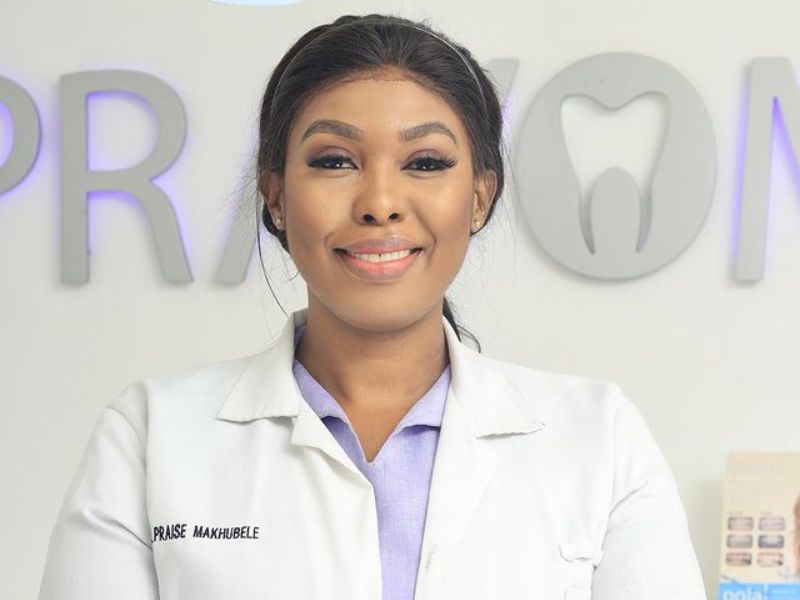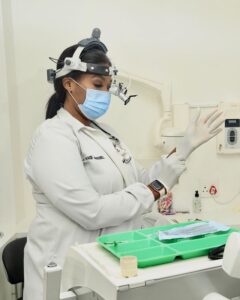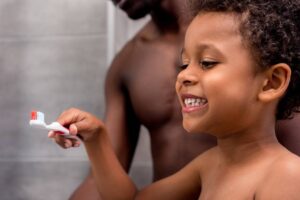“Brush Twice a Day to Keep Cavities at Bay” – In Conversation with Dr. Praise Makhubele About Children’s Oral Health Care
Share

Good oral hygiene starts as early as infancy. Whether you’re nursing or bottle feeding, you should begin incorporating some type of dental hygiene regimen as soon as possible. Pediatric dental care ensures your child’s primary teeth stay healthy and free of decay and other dental diseases. Therefore, you should engage with a professional dentist who will provide you with expert tips on how to take care of your child’s teeth at home.
Dr. Vongai Praise Makhubele, popularly known as Dr. Praise, is a registered Ortho-Dentist with a passion for oral health education. The esteemed doctor obtained qualifications in Bachelor of Sciences (UL), Bachelor of Dental Surgery (SMU), Certificate in Business Management (UNISA), as well as a PG Dip Aesthetic Dentistry (UP). An overachiever, she is currently pursuing a Master’s in Orthodontics at the University of Witwatersrand and a PG Dip in Prosthodontics at the University of Pretoria. Moreover, Dr. Praise has completed short courses in Aesthetic Dentistry in New Orleans, USA (AGD). Through her dental practice, PRAVOMA DENTAL CLINIC, Dr. Praise has built a long track record of successfully diagnosing and treating patients’ dental conditions.
We had aa chat with the doctor to discuss children’s oral health, which has been a challenge for caregivers and dental practitioners globally.

What is the normal age for a child’s baby teeth to start growing?
We should expect the lower teeth to begin erupting at six months old. This would be the baby milk teeth that will start showing on the lower jaw, which is known as the mendable.
Why is it important to look after the little one’s ‘baby teeth’?
Milk teeth play a role in the health and alignment of permanent teeth. If the baby teeth are not taken care of and develop dental health issues such as carries or decay, the child might not have teeth for a very long time until the adult ones start growing. Moreover, there will be compromised teeth in the mouth when the adult teeth start coming out, which could result in misalignment. Furthermore, teeth play an important role in speech development and are necessary for food consumption. Therefore, it is important to look after baby teeth because they help in formulating a pattern for adult teeth.
With that said, parents need to clean their children’s baby teeth using a toothbrush or a damp cloth if they are still too young. Parents should also normalise visits to the dentist with their kids to conquer the fear in their little ones.
When should a child have their first dental X-Ray?
Radiography has been modified for safety due to the advancement of technology. Therefore, children can generally have their first dental X-rays at age two. This is especially true because their baby teeth will be erupting. However, if a child has a lesion in their mouth, they should undergo periapical X-rays earlier to identify the extent of the lesion.
When should a child start using fluoride toothpaste and mouthwash?
A lot of supervision should be taken when it comes to fluoride toothpaste and mouthwash for little ones. It is recommended to start using pea-sized toothpaste between the ages of three and six. However, if they are young and prone to swallowing fluoride toothpaste, it is best to wait until the age of five. Using fluoride is very important because it inhibits the metabolism of bacteria and helps with remineralisation of the enamel – therefore strengthening it. In layman’s terms, it stops teeth from breaking. Fluoride is especially recommended for children who eat a lot of sweets because it prevents glucose from weakening the little one’s teeth.
What are the qualities of a good toothbrush and toothpaste for children?
For toothbrushes, a small beak is recommended so that it fits into the little one’s small mouth and cleans out all the food debris in their mouth. This is because big toothbrushes will not reach the back of the child’s mouth and thus not cleanse it properly. Moreover, a big toothbrush will most likely hurt the child. A soft bristle toothbrush is also recommended to avoid teeth being damaged. Hard bristle toothbrushes can cause abrasions, which refers to the wearing out of the enamel. Additionally, it is recommended that your little ones brush their teeth in circular motions, instead of brushing horizontally. This protects the neck of the teeth to avoid abrasion.
When it comes to toothpaste, a regulated amount of fluoride is most recommended – the size of a pea to be specific. It is very important to supervise children when they’re brushing their teeth so that they don’t swallow the toothpaste.

Cropped shot of two young siblings brushing their teeth in the bathroom at home
How often does a child need to visit an oral health practitioner?
It is highly recommended to take your little one to the dentist twice every year. This is because dental cleaning is done every month to avoid the build-up of calculus, which is mineralised bacteria that stains the teeth. Calculus gradually weakens the tooth structure and can cause bleeding gums. Biannual check-ups are also good for picking up possible dental problems and treating them. However, for children who are prone to dental problems, it is recommended to visit a dental practitioner every three months.
What are the most common oral health problems for children?
If not trauma to the teeth, carries and baby bottle syndrome are the most common dental problems among children. Trauma is the sense that a child fell and broke their teeth. Caries are when teeth get painful due to having holes. Treatments such as fillings are extractions are usually done to save the teeth.
Baby bottle syndrome is often a result of children having feeding bottles in their mouths for too long. This results in infections, weak teeth, and pain.
What is tooth decay and how can parents help their child prevent it?
Tooth decay is when teeth have a hole or are discoloured because of high glucose intake. High sugar intake causes demineralisation and weakens the enamel.
To prevent tooth decay, parents should monitor what their children eat. The frequency at which children eat sweets and other glucose-infused products must be monitored. It is also important for parents to instill good oral hygiene practices in their kids such as brushing their teeth twice a day to avoid decay.
At what age can a child be left to brush their teeth without supervision?
Every child is different. However, from the age of six, children are generally able to brush their teeth without any supervision. What is important is to ensure that they have good training and are supervised when they are learning how to brush their teeth. Additionally, if the child has underlying conditions that could make it difficult for them to brush their teeth independently, they should be supervised until they are ready to do so. This can prevent possible dental problems in the future.
What are some of the common mistakes made by parents when it comes to their children’s oral health?
One of the biggest problems is not visiting the dentist as often as it is recommended. Parents usually visit the dentist only when their little one is in pain which exposes problems that could have been resolved way sooner. It is important to visit an oral health practitioner every six months because prevention is better than cure. Additionally, many parents make the mistake of not regulating what their children eat. Excess consumption of glucose is unhealthy and can cause many other ailments apart from the known dental ones. Therefore, parents need to monitor their children’s diets.
In parting, Dr. Praise emphasised the importance of inspecting their children’s mouths regularly to see if there is any trauma or possible decay. For example, if your little one tells you that they fell on their mouth while playing at school, it is important to take them to a dental practitioner – even if you don’t see anything wrong with their teeth. This is to avoid a build-up of pressure inside the tooth which can result in gradual tooth damage, despite not being visible at first. Furthermore, it can cause internal bleeding and result in tooth extraction.




